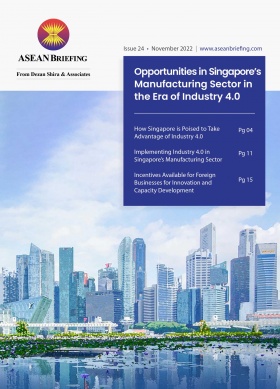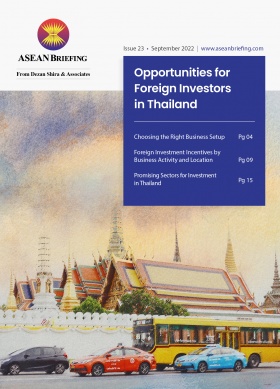A Guide to Taxation in Vietnam
All taxes in Vietnam are imposed at the national level; there are no local, city, or provincial taxes. Enterprises should pay tax in localities where they are headquartered or have duly registered branches.
Most companies and foreign investors in Vietnam are subject to the following major taxes:
- Corporate income tax;
- Business license tax;
- Value-added tax;
- Special consumption tax; and
- Foreign contractor tax.
Corporate income tax
All income arising inside Vietnam is subject to CIT, no matter whether a foreign enterprise has a Vietnam-based subsidiary, or whether that subsidiary is considered a permanent establishment (PE).
The CIT rate of 20 percent is a direct tax levied on the profits (gross revenue minus expenses) earned by companies or organizations. For companies operating in the oil and gas industries, the CIT rate is between 32 and 50 percent.Business license tax
The business license tax (BLT), is an indirect tax imposed on entities conducting business activities in Vietnam, paid by enterprises annually for each calendar year that they do business in the country. All companies, organizations, or individuals (including branches, shops, and factories) and foreign investors operating businesses in Vietnam are subject to BLT.
The BLT ranges from ranging from VND 1 million (US$41) to VND 3 million (US$124) per year.
Value-added tax
Value-added tax (VAT) is imposed on the supply of goods and services at three different rates: 0, 5, and 10 percent, with the latter being the standard rate. All organizations and individuals producing and trading goods and services in Vietnam are liable to pay VAT, regardless of whether the organization has a Vietnam-based establishment.
Personal income tax
Individuals in Vietnam are subject to personal income tax based on their residency status. A tax resident in Vietnam must satisfy one of the following criteria:
- Resides in Vietnam for 183 days or more within 12 consecutive months from the first day of arrival;
- Holds a permanent or temporary residence card for Vietnam; or
- Leases a property for 183 days or more in Vietnam.
Personal Income Tax Rates
|
Monthly income |
Tax rate (%) |
|
Up to 5,000,000 VND (S$209) |
5 |
|
Over 5,000,000 VND (S$209) up to 10,000,000 VND (US$419) |
10 |
|
Over 10,000,000 VND (US$419) up to 18,000,000 VND (US$755) |
15 |
|
Over 18,000,000 VND (US$755) up to 32,000,000 VND (US$1,343) |
20 |
|
Over 32,000,000 VND (US$1,343) up to 52,000,000 (US$2,183) |
25 |
|
Over 52,000,000 (US$2,183) up to 80,000,000 VND (US$3,358) |
30 |
|
Over 80,000,000 VND (US$3,358) |
35 |
Withholding tax
There is no withholding tax imposed on dividends for resident and non-resident companies in Vietnam. Interest rates for non-resident companies are set at five percent and can be further reduced under a tax treaty. Withholding tax on interest, royalties, and fees for technical services for resident companies are set at 20 percent.
|
Nature of income |
Tax rate (%) |
|
|
|
Residents |
Non-residents |
|
Dividends |
0 |
0 |
|
Interest |
20 |
5 |
|
Royalties |
20 |
10 |
Special consumption tax
The special consumption tax (SCT) is a form of excise tax that applies to the production or importation of 11 categories of products and six types of services, which are considered luxurious or non-essential, such as alcohol and tobacco products. Companies are liable for SCT both at the time of import and sale. However, to prevent an excessive tax burden, import SCT will be creditable against SCT incurred at the point of sale.
Foreign contractor tax
Foreign businesses are considered foreign contractors if they conduct business or earn income in the country under contract with local organizations and individuals.
Foreign contractors in Vietnam are liable to pay the same tax rates applicable to local companies, including import-export duties, personal income tax and other taxes required by authorities.
Webinar – Navigating Global Minimum Tax in Asia: Insights for Businesses
Thursday, November 16, 2023 | 9:00 AM San Francisco / 12:00 PM New York / 6:00 PM Brussels / 1:00 AM (Nov. 17th) Beijing
Partner Kyle Freeman will introduce how key Asian economies are implementing the new changes, how companies are going to be impacted, and what businesses should be doing now.
About Us
ASEAN Briefing is produced by Dezan Shira & Associates. The firm assists foreign investors throughout Asia and maintains offices throughout ASEAN, including in Singapore, Hanoi, Ho Chi Minh City, and Da Nang in Vietnam, in addition to Jakarta, in Indonesia. We also have partner firms in Malaysia, the Philippines, and Thailand as well as our practices in China and India. Please contact us at asean@dezshira.com or visit our website at www.dezshira.com.
- Previous Article Indonesia’s Top Sectors to Watch for in 2023
- Next Article Singapore Budget 2023: Impact for Businesses







